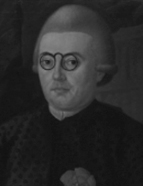

Ribeiro dos Santos, an example of an intellectual of the European Catholic Enlightenment, did not neglect historical theorising. In codex 4583 of the BNP, where we find various plans and notes for the writing of Sacred History, Ecclesiastical History, Universal History, Genealogical-Heraldic History and a definitive original of the Selecta Historia Eclesiastica Universalis, from 1774, we come across Reflexões sobre o modo de escrever a História Sagrada (Reflections on how to write Sacred History). Although the study begins with the purpose stated in the title, it is actually a synthetic approach to the writing of history in general, probably from the period when he was commissioned to write the compendiums for Pombal’s reform of the University. Starting from an exemplary perspective invoking the authority of Cicero, the testimony of the times and the light of truth, history appears as a broadening of the vision of the limitations of human nature. The problem of historical truth, in any field, requires either the overcoming of religious and political subjectivism (p. 83), or the prevention of merely conjectural discourse due to lack of evidence (“monuments”), or the economy of description and, most especially, the need for investment in chronology (duration of time) and geography (location of places). p. 97. A separate section is devoted to Mythology as the “science of fable that represents the entire Theology of the Pagans” (p. 101) but which is nevertheless necessary for a hermeneutic adequate to the understanding of historical facts, especially in the field of the arts. Mythology also takes on the character of a universal and historical argument of the divine shared by all peoples. This interpretation, inspired by the philological arguments of António Genovesi, had already appeared in his work Sacerdotio et Imperio (1770). With remarkable scholarly support, the canonist’s historiographical interests are focused on attempts to study historical origins in various subjects, particularly the origin of language. His work also includes the compilation of historiographical corpora of great erudition and research, such as De Antiquitatibus Hispaniae, in several volumes, which remained unpublished.
This work is financed by national funds through FCT - Foundation for Science and Technology, I.P, in the scope of the projects UIDB/04311/2020 and UIDP/04311/2020.
